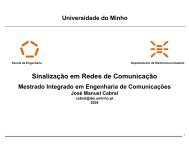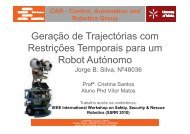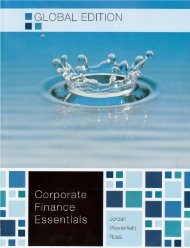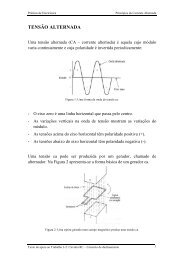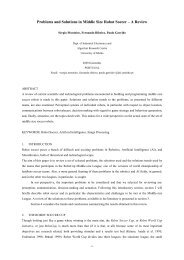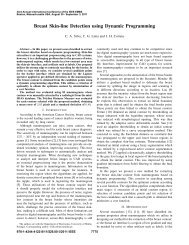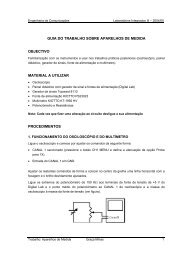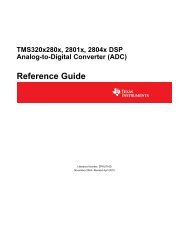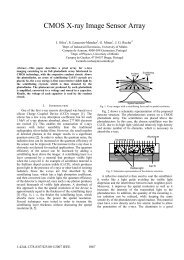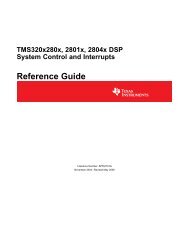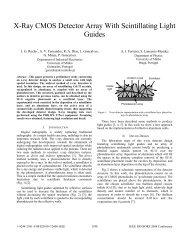- Page 3 and 4:
A Handbook ofHUMANRESOURCEMANAGEMEN
- Page 5 and 6:
ContentsList of figuresList of tabl
- Page 7 and 8:
Contents ❚ vii9 Developing and im
- Page 9 and 10:
Contents ❚ ix20 How organizations
- Page 11 and 12:
Contents ❚ xi31 Release from the
- Page 15 and 16:
Contents ❚ xv53 Employee voice 80
- Page 17 and 18:
List of figures0.1 Route map xxvi0.
- Page 19 and 20:
List of figures ❚ xix43.6 Integra
- Page 21 and 22:
xxii ❚ List of tables42.1 Economi
- Page 23 and 24:
PrefaceThis tenth edition of A Hand
- Page 25 and 26:
Part IManaging peopleThis part unde
- Page 27 and 28:
1Human resource managementThe terms
- Page 29 and 30:
Human resource management ❚ 5Huma
- Page 33:
Human resource management ❚ 9Huma
- Page 36 and 37:
12 ❚ Managing peoplemanaging huma
- Page 38 and 39:
14 ❚ Managing peoplethe HRM syste
- Page 40 and 41:
16 ❚ Managing peopleGuest (1991)
- Page 42 and 43:
18 ❚ Managing peopleContradiction
- Page 44 and 45:
20 ❚ Managing peopleThe differenc
- Page 46:
22 ❚ Managing peopleTable 1.2cont
- Page 49 and 50:
Human resource management ❚ 251.
- Page 51 and 52:
Human resource management ❚ 27●
- Page 53 and 54:
30 ❚ Managing peopleThe Accountin
- Page 55 and 56:
32 ❚ Managing peopleHowever, rese
- Page 57 and 58: 34 ❚ Managing peopleThe choices t
- Page 59 and 60: 36 ❚ Managing peoplepractice; it
- Page 61 and 62: 38 ❚ Managing peoplethe firm crea
- Page 63 and 64: 40 ❚ Managing peopleThe organizat
- Page 65 and 66: 42 ❚ Managing peopleNationwide to
- Page 67 and 68: 44 ❚ Managing peoplepredominantly
- Page 69 and 70: 46 ❚ Managing peopleIn more detai
- Page 71 and 72: 48 ❚ Managing peoplemanaged, but
- Page 73 and 74: 50 ❚ Managing people●●set out
- Page 75 and 76: 3Role of the HR functionHR function
- Page 77 and 78: Role of the HR function ❚ 55facil
- Page 79 and 80: Role of the HR function ❚ 57pract
- Page 81 and 82: Role of the HR function ❚ 59which
- Page 83 and 84: Role of the HR function ❚ 61stand
- Page 85 and 86: Role of the HR function ❚ 63monit
- Page 87 and 88: Role of the HR function ❚ 651. De
- Page 89 and 90: Role of the HR function ❚ 67●
- Page 91 and 92: Role of the HR function ❚ 69The m
- Page 93 and 94: 72 ❚ Managing peoplequalified, ar
- Page 95 and 96: 74 ❚ Managing peopleThe innovatio
- Page 97 and 98: 76 ❚ Managing peopleprocedures ar
- Page 99 and 100: 78 ❚ Managing people4. Innovative
- Page 101 and 102: 80 ❚ Managing people●●●●
- Page 103 and 104: 82 ❚ Managing people●●●●
- Page 105 and 106: 84 ❚ Managing peopleETHICAL CONSI
- Page 107: 86 ❚ Managing peoplecompetence re
- Page 111 and 112: 90 ❚ Managing peopleTable 4.1Comp
- Page 113 and 114: 92 ❚ Managing people●●●(whe
- Page 115 and 116: 94 ❚ Managing people●●●●
- Page 117 and 118: 96 ❚ Managing peopleaspects like
- Page 119 and 120: 98 ❚ Managing peopleto carry out
- Page 121 and 122: 100 ❚ Managing peoplethe need to
- Page 123 and 124: 102 ❚ Managing peopleHowever, Bre
- Page 125 and 126: 104 ❚ Managing peopleweights betw
- Page 127 and 128: 106 ❚ Managing peopleRole specifi
- Page 129 and 130: 108 ❚ Managing peoplefactors. The
- Page 131 and 132: Part IIHuman resourcemanagement pro
- Page 133 and 134: 114 ❚ HRM processesorganization
- Page 135 and 136: 116 ❚ HRM processes1. the use of
- Page 137 and 138: 118 ❚ HRM processesand HR policie
- Page 139 and 140: 120 ❚ HRM processes●●●●th
- Page 141 and 142: 8HR strategiesStrategic HRM leads t
- Page 143 and 144: HR strategies ❚ 125the organizati
- Page 145 and 146: HR strategies ❚ 127●●●●
- Page 147 and 148: HR strategies ❚ 129CRITERIA FOR A
- Page 149 and 150: 132 ❚ HRM processesPROPOSITIONS A
- Page 151 and 152: 134 ❚ HRM processesprocess of dev
- Page 153 and 154: 136 ❚ HRM processesTable 9.1Linki
- Page 155 and 156: 138 ❚ HRM processeswhich focuses
- Page 157 and 158: 140 ❚ HRM processesmutually reinf
- Page 159 and 160:
142 ❚ HRM processesAnalysis:● W
- Page 161 and 162:
144 ❚ HRM processesOne principal
- Page 163 and 164:
10HRM policiesWHAT HUMAN RESOURCE P
- Page 165 and 166:
HRM policies ❚ 149they could dist
- Page 167 and 168:
HRM policies ❚ 151Managing divers
- Page 169 and 170:
HRM policies ❚ 153Involvement and
- Page 171 and 172:
HRM policies ❚ 155Substance abuse
- Page 173 and 174:
HRM policies ❚ 1579. Consult, dis
- Page 175 and 176:
160 ❚ HRM processes●●●●
- Page 177 and 178:
162 ❚ HRM processesTable 11.1Inci
- Page 179 and 180:
164 ❚ HRM processesCOVERAGE OF CO
- Page 181 and 182:
166 ❚ HRM processesemployee’s d
- Page 183 and 184:
168 ❚ HRM processesbehaviour. Thi
- Page 185 and 186:
170 ❚ HRM processes●●●●
- Page 187 and 188:
12Knowledge managementKnowledge man
- Page 189 and 190:
Knowledge management ❚ 175THE CON
- Page 191 and 192:
Knowledge management ❚ 177various
- Page 193 and 194:
Knowledge management ❚ 179The pac
- Page 195 and 196:
Knowledge management ❚ 1813. Advi
- Page 197 and 198:
Knowledge management ❚ 183Resourc
- Page 199 and 200:
Knowledge management ❚ 185Organiz
- Page 201 and 202:
13Analysing roles, competenciesand
- Page 203 and 204:
Analysing roles, competencies and s
- Page 205 and 206:
Analysing roles, competencies and s
- Page 207 and 208:
Analysing roles, competencies and s
- Page 209 and 210:
Analysing roles, competencies and s
- Page 211 and 212:
Analysing roles, competencies and s
- Page 213 and 214:
Analysing roles, competencies and s
- Page 215 and 216:
Analysing roles, competencies and s
- Page 217 and 218:
14The nature of workIn this chapter
- Page 219 and 220:
The nature of work ❚ 207mechanism
- Page 221 and 222:
The nature of work ❚ 2091998b), f
- Page 223 and 224:
The nature of work ❚ 211(working
- Page 225 and 226:
The nature of work ❚ 213Table 14.
- Page 227 and 228:
216 ❚ Work and employmentParties
- Page 229 and 230:
218 ❚ Work and employmentSIGNIFIC
- Page 231 and 232:
220 ❚ Work and employment●●
- Page 233 and 234:
222 ❚ Work and employmentClearly,
- Page 235 and 236:
16The psychological contractThe emp
- Page 237 and 238:
The psychological contract ❚ 227o
- Page 239 and 240:
The psychological contract ❚ 229a
- Page 241 and 242:
The psychological contract ❚ 231T
- Page 243 and 244:
The psychological contract ❚ 233H
- Page 245 and 246:
The psychological contract ❚ 235r
- Page 247 and 248:
Part IVOrganizationalbehaviourPeopl
- Page 249 and 250:
17Characteristics of peopleTo manag
- Page 251 and 252:
Characteristics of people ❚ 241In
- Page 253 and 254:
Characteristics of people ❚ 243On
- Page 255 and 256:
Characteristics of people ❚ 245de
- Page 257 and 258:
Characteristics of people ❚ 247RO
- Page 259 and 260:
Characteristics of people ❚ 249
- Page 261 and 262:
252 ❚ Organizational behaviourUnf
- Page 263 and 264:
254 ❚ Organizational behaviourThe
- Page 265 and 266:
256 ❚ Organizational behaviourTab
- Page 267 and 268:
258 ❚ Organizational behaviour2.
- Page 269 and 270:
260 ❚ Organizational behaviourmor
- Page 271 and 272:
262 ❚ Organizational behaviourAs
- Page 273 and 274:
264 ❚ Organizational behaviourJOB
- Page 275 and 276:
266 ❚ Organizational behaviourtha
- Page 277 and 278:
268 ❚ Organizational behaviourare
- Page 279 and 280:
19Organizational commitment andenga
- Page 281 and 282:
Organizational commitment and engag
- Page 283 and 284:
Organizational commitment and engag
- Page 285 and 286:
Organizational commitment and engag
- Page 287 and 288:
Organizational commitment and engag
- Page 289 and 290:
Organizational commitment and engag
- Page 291 and 292:
20How organizations functionBASIC C
- Page 293 and 294:
How organizations function ❚ 285
- Page 295 and 296:
How organizations function ❚ 287M
- Page 297 and 298:
How organizations function ❚ 289O
- Page 299 and 300:
How organizations function ❚ 291T
- Page 301 and 302:
How organizations function ❚ 293I
- Page 303 and 304:
How organizations function ❚ 295G
- Page 305 and 306:
How organizations function ❚ 297
- Page 307 and 308:
How organizations function ❚ 299A
- Page 309 and 310:
How organizations function ❚ 301C
- Page 311 and 312:
304 ❚ Organizational behaviourThe
- Page 313 and 314:
306 ❚ Organizational behaviourpar
- Page 315 and 316:
308 ❚ Organizational behaviourthe
- Page 317 and 318:
310 ❚ Organizational behaviourHar
- Page 319 and 320:
312 ❚ Organizational behaviourOrg
- Page 321 and 322:
314 ❚ Organizational behaviourgoo
- Page 323 and 324:
316 ❚ Organizational behaviourtha
- Page 325 and 326:
22Organization designThe management
- Page 327 and 328:
Organization design ❚ 321●●
- Page 329 and 330:
Organization design ❚ 323consider
- Page 331 and 332:
Organization design ❚ 325new acti
- Page 333 and 334:
328 ❚ Organization, design and de
- Page 335 and 336:
330 ❚ Organization, design and de
- Page 337 and 338:
332 ❚ Organization, design and de
- Page 339 and 340:
334 ❚ Organization, design and de
- Page 341 and 342:
24Organizational development,change
- Page 343 and 344:
Organizational development, change
- Page 345 and 346:
Organizational development, change
- Page 347 and 348:
Organizational development, change
- Page 349 and 350:
Organizational development, change
- Page 351 and 352:
Organizational development, change
- Page 353 and 354:
Organizational development, change
- Page 355 and 356:
Organizational development, change
- Page 357 and 358:
Organizational development, change
- Page 359 and 360:
Organizational development, change
- Page 361 and 362:
Organizational development, change
- Page 363 and 364:
360 ❚ People resourcingcharacteri
- Page 365 and 366:
25Human resource planningDefinition
- Page 367 and 368:
Human resource planning ❚ 365func
- Page 369 and 370:
Human resource planning ❚ 367(199
- Page 371 and 372:
Human resource planning ❚ 369circ
- Page 373 and 374:
Human resource planning ❚ 371Obje
- Page 375 and 376:
Human resource planning ❚ 373what
- Page 377 and 378:
Human resource planning ❚ 375●
- Page 379 and 380:
Human resource planning ❚ 377empl
- Page 381 and 382:
Human resource planning ❚ 379Half
- Page 383 and 384:
Human resource planning ❚ 381fort
- Page 385 and 386:
Human resource planning ❚ 383the
- Page 387 and 388:
Human resource planning ❚ 385It s
- Page 389 and 390:
Human resource planning ❚ 387Over
- Page 391 and 392:
26Talent managementTalent managemen
- Page 393 and 394:
Talent management ❚ 391Attraction
- Page 395 and 396:
Talent management ❚ 393increasing
- Page 397 and 398:
Talent management ❚ 395Creating a
- Page 399 and 400:
Talent management ❚ 397as their a
- Page 401 and 402:
Talent management ❚ 399●●●
- Page 403 and 404:
Talent management ❚ 401GrowthProg
- Page 405 and 406:
Talent management ❚ 403This infor
- Page 407 and 408:
Talent management ❚ 405It is poss
- Page 409 and 410:
Talent management ❚ 407Formal car
- Page 411 and 412:
27Recruitment and selectionTHE RECR
- Page 413 and 414:
Recruitment and selection ❚ 411
- Page 415 and 416:
Recruitment and selection ❚ 4135.
- Page 417 and 418:
Recruitment and selection ❚ 415ca
- Page 419 and 420:
Recruitment and selection ❚ 417ey
- Page 421 and 422:
Recruitment and selection ❚ 419
- Page 423 and 424:
Recruitment and selection ❚ 421on
- Page 425 and 426:
Recruitment and selection ❚ 423OU
- Page 427 and 428:
Recruitment and selection ❚ 425AP
- Page 429 and 430:
Recruitment and selection ❚ 427Ad
- Page 431 and 432:
Recruitment and selection ❚ 429we
- Page 433 and 434:
Recruitment and selection ❚ 431
- Page 435 and 436:
Recruitment and selection ❚ 4331.
- Page 437 and 438:
Recruitment and selection ❚ 435(r
- Page 439 and 440:
Recruitment and selection ❚ 437st
- Page 441 and 442:
440 ❚ People resourcingcandidate
- Page 443 and 444:
442 ❚ People resourcingrequiremen
- Page 445 and 446:
444 ❚ People resourcingidentify t
- Page 447 and 448:
446 ❚ People resourcinggoes on in
- Page 449 and 450:
448 ❚ People resourcingLISTENINGS
- Page 451 and 452:
450 ❚ People resourcinginterview
- Page 453 and 454:
452 ❚ People resourcingThe follow
- Page 455 and 456:
454 ❚ People resourcingQuestions
- Page 457 and 458:
456 ❚ People resourcingQuestions
- Page 459 and 460:
458 ❚ People resourcingsaying. Wh
- Page 461 and 462:
460 ❚ People resourcing●●make
- Page 463 and 464:
462 ❚ People resourcingindividual
- Page 465 and 466:
464 ❚ People resourcingand measur
- Page 467 and 468:
466 ❚ People resourcingprocedure,
- Page 469 and 470:
468 ❚ People resourcingCHOOSING T
- Page 471 and 472:
30Introduction to the organizationI
- Page 473 and 474:
Introduction to the organization
- Page 475 and 476:
Introduction to the organization
- Page 477 and 478:
Introduction to the organization
- Page 479 and 480:
31Release from the organizationGENE
- Page 481 and 482:
Release from the organization ❚ 4
- Page 483 and 484:
Release from the organization ❚ 4
- Page 485 and 486:
Release from the organization ❚ 4
- Page 487 and 488:
Release from the organization ❚ 4
- Page 489 and 490:
Release from the organization ❚ 4
- Page 491 and 492:
Release from the organization ❚ 4
- Page 493 and 494:
32The basis of performancemanagemen
- Page 495 and 496:
The basis of performance management
- Page 497 and 498:
The basis of performance management
- Page 499 and 500:
The basis of performance management
- Page 501 and 502:
33The process of performancemanagem
- Page 503 and 504:
The process of performance manageme
- Page 505 and 506:
The process of performance manageme
- Page 507 and 508:
The process of performance manageme
- Page 509 and 510:
The process of performance manageme
- Page 511 and 512:
The process of performance manageme
- Page 513 and 514:
The process of performance manageme
- Page 515 and 516:
The process of performance manageme
- Page 517 and 518:
The process of performance manageme
- Page 519 and 520:
522 ❚ Performance managementManag
- Page 521 and 522:
524 ❚ Performance management●be
- Page 523 and 524:
526 ❚ Performance managementActio
- Page 525 and 526:
528 ❚ Performance management●
- Page 527 and 528:
Part VIIIHuman resourcedevelopmentH
- Page 529 and 530:
534 ❚ Human resource developmentS
- Page 531 and 532:
536 ❚ Human resource developmentS
- Page 533 and 534:
36Organizational learning and thele
- Page 535 and 536:
Organizational learning and the lea
- Page 537 and 538:
Organizational learning and the lea
- Page 539 and 540:
Organizational learning and the lea
- Page 541 and 542:
Organizational learning and the lea
- Page 543 and 544:
550 ❚ Human resource developmentA
- Page 545 and 546:
552 ❚ Human resource developmentL
- Page 547 and 548:
554 ❚ Human resource developmentL
- Page 549 and 550:
556 ❚ Human resource developmentE
- Page 551 and 552:
558 ❚ Human resource developmentT
- Page 553 and 554:
560 ❚ Human resource developmentT
- Page 555 and 556:
562 ❚ Human resource developmente
- Page 557 and 558:
564 ❚ Human resource developmentI
- Page 559 and 560:
566 ❚ Human resource developmentL
- Page 561 and 562:
568 ❚ Human resource development
- Page 563 and 564:
570 ❚ Human resource developmentB
- Page 565 and 566:
572 ❚ Human resource development
- Page 567 and 568:
574 ❚ Human resource development5
- Page 569 and 570:
576 ❚ Human resource developmente
- Page 571 and 572:
578 ❚ Human resource developmenti
- Page 573 and 574:
580 ❚ Human resource developmentw
- Page 575 and 576:
582 ❚ Human resource developmentp
- Page 577 and 578:
584 ❚ Human resource development
- Page 579 and 580:
586 ❚ Human resource development
- Page 581 and 582:
588 ❚ Human resource developmentD
- Page 583 and 584:
590 ❚ Human resource developmentE
- Page 585 and 586:
592 ❚ Human resource developmentA
- Page 587 and 588:
594 ❚ Human resource developmentN
- Page 589 and 590:
596 ❚ Human resource development
- Page 591 and 592:
598 ❚ Human resource developmentF
- Page 593 and 594:
600 ❚ Human resource development
- Page 595 and 596:
602 ❚ Human resource developmentD
- Page 597 and 598:
604 ❚ Human resource developmentw
- Page 599 and 600:
606 ❚ Human resource development
- Page 601 and 602:
608 ❚ Human resource developmentr
- Page 603 and 604:
610 ❚ Human resource developmentI
- Page 605 and 606:
612 ❚ Human resource developmentp
- Page 607 and 608:
614 ❚ Human resource developmentA
- Page 609 and 610:
616 ❚ Human resource developmentL
- Page 611 and 612:
618 ❚ Human resource developmentE
- Page 613 and 614:
620 ❚ Human resource developmentt
- Page 615 and 616:
42Reward managementThis chapter pro
- Page 617 and 618:
Reward management ❚ 625The philos
- Page 619 and 620:
Reward management ❚ 627Reward pol
- Page 621 and 622:
Reward management ❚ 629Performanc
- Page 623 and 624:
Reward management ❚ 631Base payTr
- Page 625 and 626:
Reward management ❚ 633MODEL OF T
- Page 627 and 628:
Reward management ❚ 635Elements o
- Page 629 and 630:
Reward management ❚ 637Table 42.2
- Page 631 and 632:
Reward management ❚ 639Payment-by
- Page 633 and 634:
Reward management ❚ 641Table 42.3
- Page 635 and 636:
644 ❚ Rewarding peopleprocesses t
- Page 637 and 638:
646 ❚ Rewarding peopleWhat should
- Page 639 and 640:
648 ❚ Rewarding peopleExamples of
- Page 641 and 642:
650 ❚ Rewarding peopleReward phil
- Page 643 and 644:
652 ❚ Rewarding people1. They hav
- Page 645 and 646:
654 ❚ Rewarding peopleAs stated i
- Page 647 and 648:
656 ❚ Rewarding peopleOther examp
- Page 649 and 650:
44Job evaluationJob evaluation is o
- Page 651 and 652:
Job evaluation ❚ 661elements are
- Page 653 and 654:
Job evaluation ❚ 663‘matched’
- Page 655 and 656:
Job evaluation ❚ 665receives one
- Page 657 and 658:
Job evaluation ❚ 667A ‘propriet
- Page 659 and 660:
Job evaluation ❚ 669Table 44.1Com
- Page 661 and 662:
Job evaluation ❚ 671Making the ch
- Page 663 and 664:
Job evaluation ❚ 673Design and pr
- Page 665 and 666:
Job evaluation ❚ 675ActivityMonth
- Page 667 and 668:
Job evaluation ❚ 677Step 4. Formu
- Page 669 and 670:
Job evaluation ❚ 679weighting is
- Page 671 and 672:
45Market rate analysisPURPOSETo ens
- Page 673 and 674:
Market rate analysis ❚ 683●job
- Page 675 and 676:
Market rate analysis ❚ 685to take
- Page 677 and 678:
Market rate analysis ❚ 687Table 4
- Page 679 and 680:
690 ❚ Rewarding peoplePAY STRUCTU
- Page 681 and 682:
692 ❚ Rewarding people£Figure 46
- Page 683 and 684:
694 ❚ Rewarding people£Figure 46
- Page 685 and 686:
696 ❚ Rewarding peopleCareer fami
- Page 687 and 688:
698 ❚ Rewarding peopleor start-up
- Page 689 and 690:
700 ❚ Rewarding peopleTable 46.1c
- Page 691 and 692:
702 ❚ Rewarding peoplewhen the di
- Page 693 and 694:
704 ❚ Rewarding peoplePay range o
- Page 695 and 696:
47Contingent payThis chapter starts
- Page 697 and 698:
Contingent pay ❚ 709persists in t
- Page 699 and 700:
Contingent pay ❚ 711●●●●
- Page 701 and 702:
Contingent pay ❚ 713CRITERIA FOR
- Page 703 and 704:
Contingent pay ❚ 715Basis of sche
- Page 705 and 706:
Contingent pay ❚ 717The case for
- Page 707 and 708:
Contingent pay ❚ 719ApplicationSk
- Page 709 and 710:
Contingent pay ❚ 721The arguments
- Page 711 and 712:
Contingent pay ❚ 723Table 47.1con
- Page 713 and 714:
Contingent pay ❚ 725●●●●
- Page 715 and 716:
Contingent pay ❚ 727Save-As-You-E
- Page 717 and 718:
730 ❚ Rewarding peoplenormal bene
- Page 719 and 720:
732 ❚ Rewarding peopleoutside the
- Page 721 and 722:
734 ❚ Rewarding peopleDevelopment
- Page 723 and 724:
49Managing reward systemsManaging r
- Page 725 and 726:
Managing reward systems ❚ 739EVAL
- Page 727 and 728:
Managing reward systems ❚ 741visi
- Page 729 and 730:
Managing reward systems ❚ 743high
- Page 731 and 732:
Managing reward systems ❚ 745REWA
- Page 733 and 734:
Managing reward systems ❚ 747Devo
- Page 735 and 736:
Managing reward systems ❚ 749What
- Page 737 and 738:
752 ❚ Employee relationsmainly co
- Page 739 and 740:
754 ❚ Employee relationsdescripti
- Page 741 and 742:
756 ❚ Employee relationsis greate
- Page 743 and 744:
758 ❚ Employee relationssome degr
- Page 745 and 746:
760 ❚ Employee relationsEmployees
- Page 747 and 748:
762 ❚ Employee relationsGuest not
- Page 749 and 750:
764 ❚ Employee relationswere that
- Page 751 and 752:
766 ❚ Employee relations‘Manage
- Page 753 and 754:
768 ❚ Employee relationsThe Trade
- Page 755 and 756:
770 ❚ Employee relationsInstituti
- Page 757 and 758:
51Employee relations processesEmplo
- Page 759 and 760:
Employee relations processes ❚ 77
- Page 761 and 762:
Employee relations processes ❚ 77
- Page 763 and 764:
Employee relations processes ❚ 77
- Page 765 and 766:
Employee relations processes ❚ 78
- Page 767 and 768:
Employee relations processes ❚ 78
- Page 769 and 770:
Employee relations processes ❚ 78
- Page 771 and 772:
Employee relations processes ❚ 78
- Page 773 and 774:
Employee relations processes ❚ 78
- Page 775 and 776:
Employee relations processes ❚ 79
- Page 777 and 778:
Employee relations processes ❚ 79
- Page 779 and 780:
52Negotiating and bargainingCollect
- Page 781 and 782:
Negotiating and bargaining ❚ 797c
- Page 783 and 784:
Negotiating and bargaining ❚ 799U
- Page 785 and 786:
Negotiating and bargaining ❚ 801%
- Page 787 and 788:
Negotiating and bargaining ❚ 803C
- Page 789 and 790:
Negotiating and bargaining ❚ 805t
- Page 791 and 792:
808 ❚ Employee relationsINVOLVEME
- Page 793 and 794:
810 ❚ Employee relationsFACTORS A
- Page 795 and 796:
812 ❚ Employee relationstrained,
- Page 797 and 798:
814 ❚ Employee relationsSUGGESTIO
- Page 799 and 800:
54CommunicationsOrganizations funct
- Page 801 and 802:
Communications ❚ 819very much abo
- Page 803 and 804:
Communications ❚ 821Communication
- Page 805 and 806:
Communications ❚ 823BulletinsBull
- Page 807 and 808:
Communications ❚ 825A team briefi
- Page 809 and 810:
55Health and safetyHealth and safet
- Page 811 and 812:
Health and safety ❚ 831the over-r
- Page 813 and 814:
Health and safety ❚ 833for the he
- Page 815 and 816:
Health and safety ❚ 835●●●W
- Page 817 and 818:
Health and safety ❚ 837Procedures
- Page 819 and 820:
Health and safety ❚ 839●●●
- Page 821 and 822:
Health and safety ❚ 841ACCIDENT P
- Page 823 and 824:
Health and safety ❚ 843informatio
- Page 825 and 826:
56Welfare servicesWelfare services
- Page 827 and 828:
Welfare services ❚ 847effect, pla
- Page 829 and 830:
Welfare services ❚ 849part-time s
- Page 831 and 832:
Welfare services ❚ 851GROUP WELFA
- Page 833 and 834:
Welfare services ❚ 853discuss per
- Page 835 and 836:
57Employment practicesEmployment pr
- Page 837 and 838:
Employment practices ❚ 859●●
- Page 839 and 840:
Employment practices ❚ 861The pol
- Page 841 and 842:
Employment practices ❚ 863The Wor
- Page 843 and 844:
Employment practices ❚ 865●●
- Page 845 and 846:
Employment practices ❚ 867ETHNIC
- Page 847 and 848:
Employment practices ❚ 8692. allo
- Page 849 and 850:
Employment practices ❚ 871Solutio
- Page 851 and 852:
Employment practices ❚ 873SUBSTAN
- Page 853 and 854:
Employment practices ❚ 875unsuita
- Page 855 and 856:
Employment practices ❚ 877●●
- Page 857 and 858:
880 ❚ Employment and HRM services
- Page 859 and 860:
882 ❚ Employment and HRM services
- Page 861 and 862:
884 ❚ Employment and HRM services
- Page 863 and 864:
886 ❚ Employment and HRM services
- Page 865 and 866:
888 ❚ Employment and HRM services
- Page 867 and 868:
890 ❚ Employment and HRM services
- Page 869 and 870:
892 ❚ Employment and HRM services
- Page 871 and 872:
894 ❚ Employment and HRM services
- Page 873 and 874:
896 ❚ Employment and HRM services
- Page 875 and 876:
898 ❚ Employment and HRM services
- Page 877 and 878:
900 ❚ Employment and HRM services
- Page 879 and 880:
902 ❚ Employment and HRM services
- Page 881 and 882:
904 ❚ Employment and HRM services
- Page 883 and 884:
906 ❚ Employment and HRM services
- Page 885 and 886:
908 ❚ AppendixHow to complete the
- Page 887 and 888:
ReferencesACAS (1982) Developments
- Page 889 and 890:
References ❚ 913Armstrong, M and
- Page 891 and 892:
References ❚ 915Bessant, J, Caffy
- Page 893 and 894:
References ❚ 917Brown, D (1998) P
- Page 895 and 896:
References ❚ 919Chartered Institu
- Page 897 and 898:
References ❚ 921Digman, L A (1990
- Page 899 and 900:
References ❚ 923Fein, M (1970) Ap
- Page 901 and 902:
References ❚ 925Gratton, L, Haile
- Page 903 and 904:
References ❚ 927Hall, L and Torri
- Page 905 and 906:
References ❚ 929Hoyle, E (1995)
- Page 907 and 908:
References ❚ 931IRS Employment Tr
- Page 909 and 910:
References ❚ 933Kessler, S and Un
- Page 911 and 912:
References ❚ 935Littler, C and Sa
- Page 913 and 914:
References ❚ 937Mayo, A and Lank,
- Page 915 and 916:
References ❚ 939Nielsen, N H (200
- Page 917 and 918:
References ❚ 941Porter, M (1980)
- Page 919 and 920:
References ❚ 943Rodger, A (1952)
- Page 921 and 922:
References ❚ 945Sims, R R (1994)
- Page 923 and 924:
References ❚ 947Tannenbaum S I, B
- Page 925 and 926:
References ❚ 949Walker, N (2004)
- Page 927 and 928:
References ❚ 951Wright, D S and T
- Page 929 and 930:
954 ❚ Subject indexattraction pol
- Page 931 and 932:
956 ❚ Subject indexdefining techn
- Page 933 and 934:
958 ❚ Subject indexunitary view 7
- Page 935 and 936:
960 ❚ Subject indexgrade structur
- Page 937 and 938:
962 ❚ Subject indexlinking HR wit
- Page 939 and 940:
964 ❚ Subject indexinternational
- Page 941 and 942:
966 ❚ Subject indexlearning needs
- Page 943 and 944:
968 ❚ Subject indexinfluence of t
- Page 945 and 946:
970 ❚ Subject indexand role analy
- Page 947 and 948:
972 ❚ Subject indexreward systems
- Page 949 and 950:
974 ❚ Subject indexstand-by allow
- Page 951 and 952:
976 ❚ Subject indexvoice see empl
- Page 953 and 954:
978 ❚ Author indexBradley, P 107-
- Page 955 and 956:
980 ❚ Author indexLeventhal, S 22
- Page 957:
982 ❚ Author indexUndy, R 215-16U



